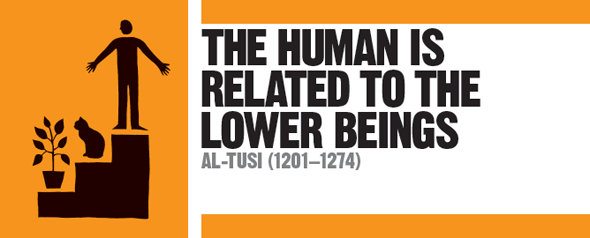
IN CONTEXT
Biology
c.550 BCE Anaximander of Miletus proposes that animal life began in the water, and evolved from there.
c.340 BCE Plato’s theory of forms argues that species are unchangeable.
c.300 BCE Epicurus says that many other species have been created in the past, but only the most successful survive to have offspring.
1377 Ibn Khaldun writes in Muqaddimah that humans developed from monkeys.
1809 Jean-Baptiste Lamarck proposes a theory of evolution of species.
1858 Alfred Russel Wallace and Charles Darwin suggest a theory of evolution by means of natural selection.
A Persian scholar born in Baghdad in 1201, during the Golden Age of Islam, Nazir al-Din al-Tusi was a poet, philosopher, mathematician, and astronomer, and one of the first to propose a system of evolution. He suggested that the Universe had once comprised identical elements that had gradually drifted apart, with some becoming minerals and others, changing more quickly, developing into plants and animals.
In Akhlaq-i-Nasri, al-Tusi’s work on ethics, he set out a hierarchy of life forms, in which animals were higher than plants and humans were higher than other animals. He regarded the conscious will of animals as a step towards the consciousness of humans. Animals are able to move consciously to search for food, and can learn new things. In this ability to learn, al-Tusi saw an ability to reason: “The trained horse or hunting falcon is at a higher point of development in the animal world,” he said, adding, “The first steps of human perfection begin from here.” Al-Tusi believed that organisms changed over time, seeing in that change a progression towards perfection. He thought of humans as being on a “middle step of the evolutionary stairway”, potentially able by means of their will to reach a higher developmental level. He was the first to suggest that not only do organisms change over time, but that the whole range of life has evolved from a time when there was no life at all.
"The organisms that can gain the new features faster are more variable. As a result, they gain advantages over other creatures."
al-Tusi
See also: Carl Linnaeus • Jean-Baptiste Lamarck • Charles Darwin • Barbara McClintock